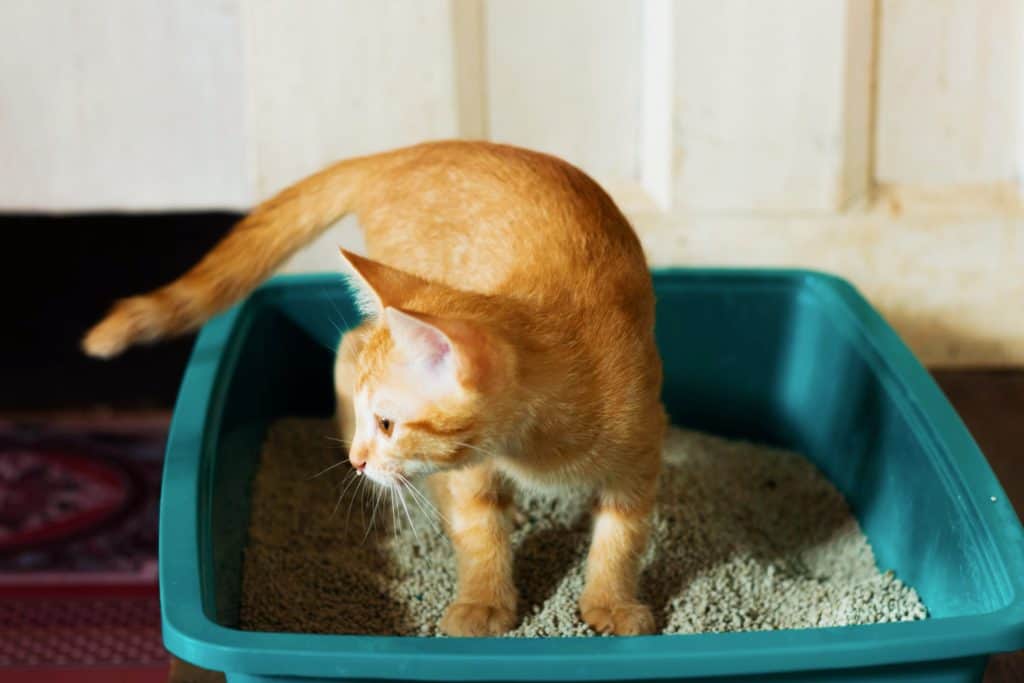
Reader Question:
I just noticed my cat Felix meowing when he goes to the litter box, which he's never done before. It seems like he's in pain trying to pee. Why does my cat meow when going to the litter box all of a sudden?
John Miller, Albany, New York
As an experienced cat owner myself, I know how worrying it can be when your feline friend starts vocalizing during bathroom breaks. This happened with my tabby, Ginger, a few years ago. After taking him to the vet, I realized the culprit behind Ginger’s litter box lamenting was crystals that had formed in his urine.
When I noticed Ginger beginning to cry out while peeing, I knew something was wrong. He had never exhibited pain like this before when going to do his business.
As a cat expert and owner for many years, I’m familiar with the most common medical causes of litter box vocalization. Here’s what to watch for and when it’s time to call the vet.
Urinary Tract Infection
One common cause of painful peeing is a medical condition known as Feline lower urinary tract disease or FLUTD.
This syndrome is a lot like a UTI in people, but it does not have to involve the presence of bacteria. As most of us know, struggling with a UTI can be extremely uncomfortable and even painful. Vocalization around litter box time is, therefore, common.
Signs of a UTI in cats include:
- Crying or meowing while urinating
- Straining to pee
- Frequently visiting the litter box
- Blood in the urine
- Excessive licking of the genital area
If you spot these symptoms, get Kitty checked by a vet right away. They will analyze a urine sample to test for bacteria. Often antibiotics are prescribed to clear up the infection. Pain medication may also help provide relief while treatment runs its course.
Crystals or Stones
In Ginger’s case, the specific cause of his litter box lamenting was crystals that had formed in his urine. When the pH of cat urine gets too high or too low, it allows tiny crystal fragments to take shape.
As these crystals pass through the narrow urethra, they scratch the sensitive lining, causing a burning sensation.
Crystals can look like this under a microscope:
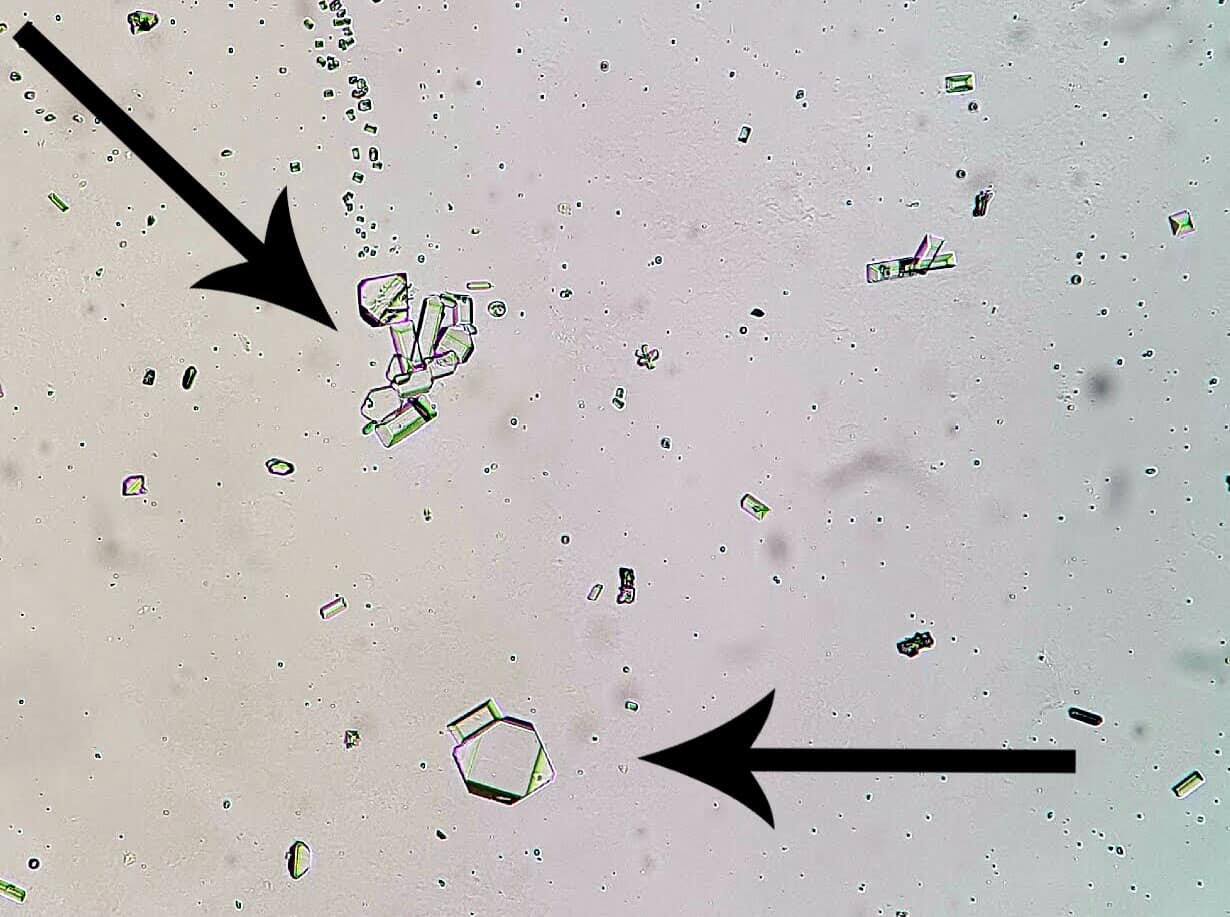
Seeing this image from Ginger’s test results explained why he was crying in pain when trying to pee.
In severe cases, the crystals continue building up into larger bladder stones that block the urethra. This dangerous condition requires emergency veterinary care.
If you notice your cat is unable to pass urine properly, call an emergency vet at once.
More mild crystal cases may exhibit the following:
- Crying during bathroom breaks
- Straining or discomfort urinating
- Blood in the urine
- Excessive licking of the genital area
To diagnose crystals, vets will analyze a urine sample for pH levels and check for crystal fragments. Treatment involves prescription food to balance urine pH and allow the crystals to dissolve. This quickly resolved Ginger’s issue and got him feeling happy again.
Constipation
When cats get backed up and constipated, the strain of passing hard stools can cause them to vocally complain in the litter box. So, if your cat started meowing when going to the litter box, constipation is another potential suspect.
In addition to meowing or straining to poop, constipated cats may also:
- Pass small, hard stools
- Frequently visit the litter box with little success
- Have a hunched posture while eliminating
- Lick their bottoms excessively
Vets can provide stool softeners or laxatives to relieve constipation. Adjusting the cat’s diet and hydration is key for long-term relief.
Impacted Anal Sacs
Some vocalization during elimination may stem from impacted or infected anal sacs. These small glands around a cat’s anus can fill with fluid that should empty when defecating. But when blocked, the area becomes inflamed and painful.
Signs of impacted anal sacs include:
- Crying when pooping
- Excessive licking of the rear end
- Pain when the bottom is pressed
- Bad odor from behind
Vets drain the sacs manually and may prescribe antibiotics for infection. Adding more fiber to their diet can help empty the sacs naturally.
The Litter Box Itself
Sometimes the litter box setup itself causes anxiety in cats. An undersized, dirty box or the wrong litter type can make bathroom time stressful. Cats also dislike sharing boxes or having them near loud appliances.
To avoid stress over the litter box setup, follow these guidelines:
- The box should be 1.5 times larger than your cat
- Scoop daily
- Place the box in a quiet, low-traffic location.
- Have multiple boxes for multi-cat households
- Use unscented litter
There's more to litter box setup. So much more that I've put together an entire site dedicated to the topic. Here are some more guides -
Where To Put The Litter Box? A Concise Room-By-Room Guide
How Often Should You Clean A Litter Box? [Answered]
Stress and Anxiety
Sometimes there may not be a specific medical issue causing litter box vocalization. General stress and anxiety can also manifest in cats meowing during urination or defecation.
Changes to their routine, environment, or housing situation can cause some cats to feel on edge. The litter box itself may be an anxious trigger if it's not set up to the cat's liking.
Ensuring a calm environment, proper litter box conditions, and sticking to a routine can help minimize feline stress. But sudden inappropriate vocalization still warrants a veterinary visit to rule out medical problems first.
When to Call the Vet
Vocalization during litter box visits always merits a call to the veterinarian.
If this is a new occurrence, pay attention. Only you know your cat's normal bathroom habits. Any deviation should be checked, especially combined with the above symptoms:
- Crying or straining
- Excessive licking
- Frequent trips with little success
- Blood in urine or stools
Track these issues and contact your vet promptly if concerned. You know your cat best. Trust your instincts if something seems off. With proper treatment guided by your vet, your cat's trips to the litter box will be quiet and carefree again.
Please consider pinning this page. Here's an image you can use -
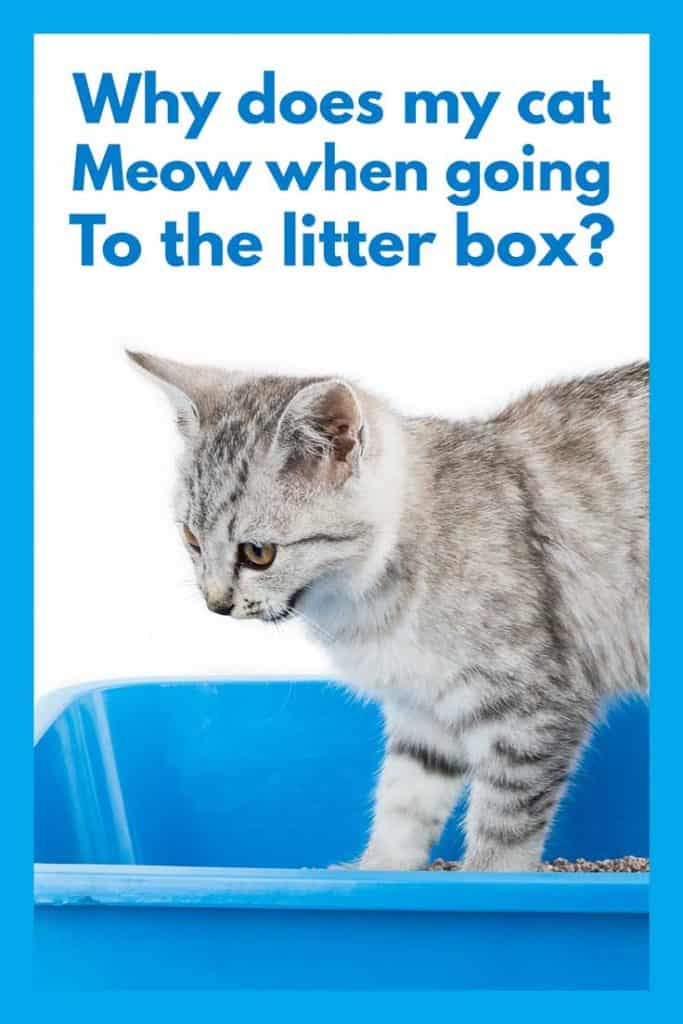

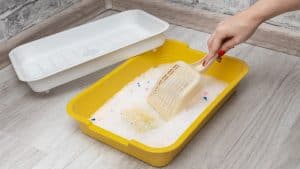
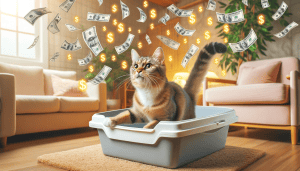
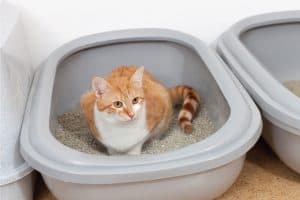
great article
My kitten is 8wks ,I think she may be younger, she crys in the litterbox , she also plays in it so I think
My male cat used to cry before using the litter. I watched him and the urine and stool were normal with no evidence of any distress during elimination.
I discussed this with the vet along with a noticeable weight loss, but the vet felt there was no problem because all else was good. Eyes, teeth, no lethargy or other worrying signs.
I lost my boy 2 days ago now, turned out he had pneumonia. He was too far gone by the time he started to display the classic pneumonia symptoms.
I only wish I had insisted on further tests when I reported the weight loss and crying before using the litter.